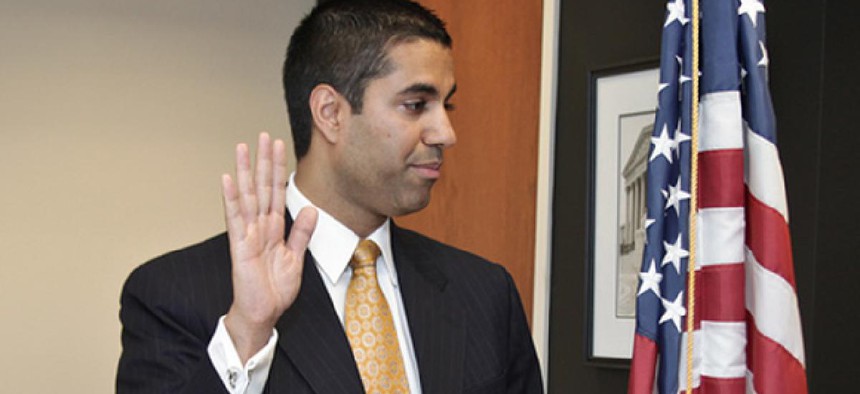New FCC member proposes innovation office

Ajit Pai was sworn into his position in May. FCC photo
The new unit would be carved out of the Office of Strategic Planning and Policy Analysis.
PITTSBURGH — Ajit Pai, the Federal Communications Commission’s newest member, isn't letting his lack of seniority get in the way of big ideas.
Pai is pushing for the creation of an FCC unit called the Office of Entrepreneurial Innovation to enforce an obscure provision of the Communications Act that requires the FCC to rule on the public benefit of new technologies or services proposed to the commission.
Such an office might have shortened the five-year process that led to the approval of dedicated national spectrum for wireless medical devices, Pai said in an interview with National Journal immediately after a speech on Wednesday at Carnegie Mellon University. “That proposal could have been given an institutional priority which might have helped break the logjam that existed in the private sector.”
The new unit would be carved out of the commission's Office of Strategic Planning and Policy Analysis and staffed with members from other departments within the FCC. “We would use existing resources to create the office,” Pai said. “My expectation is that it would be cost-neutral.”
In his speech, Pai linked the FCC’s proclivity for “bureaucratic inertia” to stalling job creation in the high-tech sector—particularly in the replacement of traditional copper wire with fiber-optic Internet Protocol networks.
With employment down in the telecommunications sector at a time of fast-moving technological advances, Pai believes that the FCC’s “top priority” is to encourage market conditions that spur job creation. “Delays at the commission have substantial real-world consequences,” he said. “New technologies remain on the shelves, capital lies fallow, and entrepreneurs stop hiring or, even worse, reduce their workforce as they wait for regulatory uncertainty to work itself out.”
The convergence of communications technologies and media is making a great deal of the current regulatory framework obsolete, Pai argued, noting that the latest update of the Communications Act “divides the communications marketplace into silos of technologies and services.”
Until Congress rewrites the telecommunications law, Pai said, “the commission really needs to think long and hard about how to hasten that transition to all IP. Whether it’s under the rubric of information services, which have traditionally not been regulated, is a question we’re going to have to confront.” Pai is urging the establishment of an IP transition task force to identify and remove barriers to upgrading communications infrastructure.
Pai also wants the FCC to send a signal using its forbearance authority, which allows it to opt not to regulate in certain situations where it might otherwise be appropriate, to permit mergers and other transactions between cable operators and competitive local exchange carriers (wireline communications providers) that would, Pai believes, encourage competition in special access services and stimulate fiber broadband construction in urban centers. “I think the key is that a transition to all-IP would benefit everyone—industry as well as consumers.”
Reforms that Pai suggests to speed up the FCC include consolidating some of the online presentation of FCC proceedings, sticking to internal deadlines, and establishing a nine-month deadline to rule on review applications and appeals. “I have endorsed various proposals within the FCC Process Reform Act,” Pai said. “In this speech, I was focused more on things the FCC itself can do without the aid of legislation.”
Pai also appears to be aiming to make a name for himself as a regulator with a strong vision of the future. To that end, he might also consider having his staff establish a Wikipedia presence for the new commissioner. Currently, a search for Ajit Pai yields an entry for an Indian cricket player—one that the FCC’s own Wikipedia page links to.
“Somehow, I need to take action to make sure that people know I’m not some cricketer from the 1940s,” Pai said.






